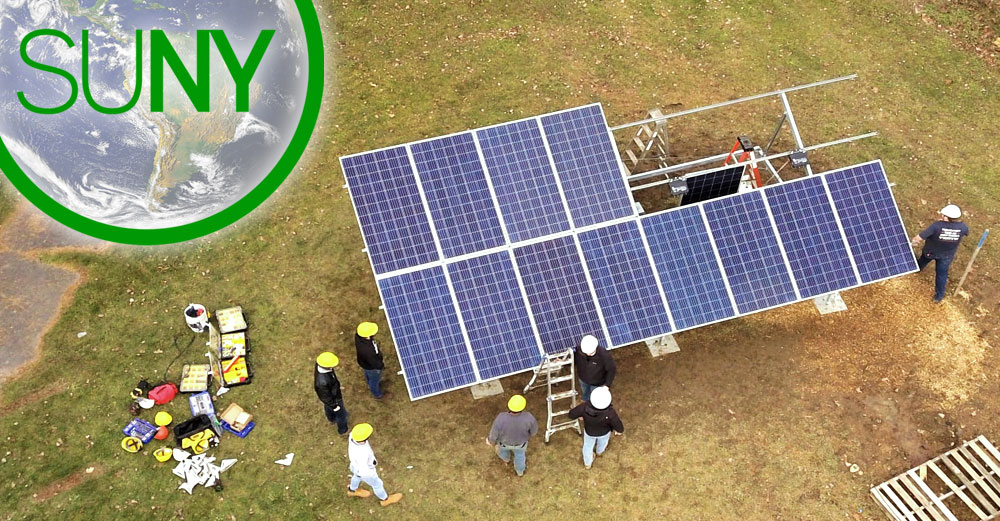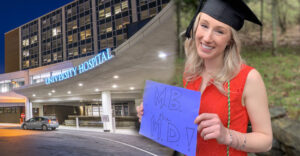
Earth Day is a day to celebrate and demonstrate our support for environmental protection throughout the world, and this year marks its 50th year. Even during these challenging times, we want to recognize the good things taking place in New York to make our world a cleaner, greener, place.
In celebration of the 50th anniversary of Earth Day, SUNY is happy to announce we’ve met the Governor’s 20 x 20 goal, also known as Executive Order 88, under the BuildSmart NY program. The goal is to achieve a 20% reduction in energy use intensity (EUI) by 2020. EUI is a metric used to express energy per square foot.
Meeting the goal requires involvement from all 64 of our campuses, and they are all doing their part to help us get there. Large and small efforts are coming together to reduce energy use, increase recycling, and embrace new renewable forms of energy.
Here’s a small sample of what some of our schools are proud to highlight as recent or in-development accomplishments to build a more sustainable SUNY:
- SUNY Adirondack is purchasing solar power from a 1.5-megawatt solar array.
- University at Albany won the EPA’s Region 2 Waste Wise Award for student efforts to educate the campus on what can be recycled and composted, and for developing simple sorting bins.
- Under its campus-wide “Reuse, Repurpose, Recycle” initiative, students at Alfred State College are converting shipping containers into homes.
- Approximately 90 percent of dairy products and 15 percent of produce served on the SUNY Brockport campus come from local sources.
- Broome Community College has a geothermal system that harnesses the energy stored in the earth to heat and cool the campus.
- Buffalo State collects compost from Farmer Pirates, a cooperative of urban farmers, whose contributions have helped the campus amass more than 71 tons of organic waste since 2013.
- SUNY Cobleskill commercialized a rotary gasifier that turns combustible waste into biofuel and a soil supplement.
- Binghamton University has made a commitment to repurposing existing buildings, while applying LEED standards when new construction is required.
- Columbia-Greene Community College’s Student Food Pantry and Health Matters Committees joined forces with CLYNK, a program that recycles bottles and cans, to raise funds to support the food pantry and provide wellness activities for employees.
- SUNY Delhi holds a community tree planting event every semester at the Delhi Outdoor Education Center, while educating students on the importance of trees for carbon capture and erosion prevention.
- The SUNY College of Environmental Science and Forestry is the first college in New York and third in the nation to sign the #breakfreefromplastic campus pledge, committing to develop a roadmap to a plastic-free campus by 2025.
- Farmingdale State College celebrates the sustainability training done by Professor Marjaneh Issapour, Director of the Renewable Energy and Sustainability Center.
- Fashion Institute of Technology is participating in its fifth Biodesign Challenge, a global biotechnology competition that is leading to innovations at FIT, such as biodegradable fibers.
- Finger Lakes Community College designed and built a bioswale at the main campus that filters contaminants from runoff before it flows into Canandaigua Lake.
- Genesee Community College built a pedestrian walkway in its parking lot and surrounded it with gardens that feature 50 large trees and 2,500 plants.
- The eGarden at SUNY Geneseo is a 1-acre plot on campus that is dedicated to undergraduate research in sustainability, with a focus on renewable energy, organic waste and sustainable agriculture.
- Since 2018, Hudson Valley Community College has sent a “Sustainability Tip of the Week” to the entire campus community.
- Jamestown Community College continues to plant new trees every April on its campuses in Jamestown and Olean.
- Jefferson Community College has an ice-enhanced chiller plant that makes ice at night during off-peak hours.
- Students at SUNY Morrisville designed and installed a ground-mounted solar array at the Aquaculture Center.
- SUNY New Paltz developed a Campus Pollinator Habitat Plan that protects bees, butterflies, hummingbirds, and other pollinators, and their natural environment.
- SUNY Old Westbury has created an apiary with 11 active beehives and a pollinator garden.
- Through its campus tree program, SUNY Oneonta demonstrates its commitment to urban forest management and meeting conservation goals.
- Onondaga Community College will complete its conversion of all 340 exterior lights to LED in June and continue the transition indoors.
- The SUNY College of Optometry replaced its water fountains with water filling stations and swapped in low flow shower heads.
- During the eight-week summer session, SUNY Orange Community College operates on a four-day workweek, allowing the campus to close selected buildings and reduce utility usage.
- Through its student club Biketopia, SUNY Plattsburgh promotes bicycling as a green alternative and encourages biking with free repairs.
- SUNY Polytechnic Institute in Utica is building Hilltop Residence Hall, its first “zero-net, carbon certified” structure, which will use renewable energy resources.
- A group of environmental studies students at SUNY Potsdam helped create a student-funded sustainability fee, dedicated to projects that make the campus greener.
- Purchase College has a new bioswale that filters more than 26,500 cubic feet of water runoff.
- Stony Brook University uses sophisticated energy heat maps to assess daily energy usage and ensure buildings are operating as efficiently as possible.
- Graduates at Suffolk Community College wear graduation gowns made from 100% recycled plastic bottles.
- Through its Culinary Center Coltivare, Tompkins Cortland Community College is providing farm-to-school trainings for local school district food service workers.
- Last year, SUNY Upstate Medical University completed an upgrade project at Upstate Community Hospital that converted all fluorescent lighting to LEDs, installed more efficient chillers, and improved the efficiency of the steam boiler combustion and heating controls.
- Westchester Community College’s Native Plant Center works with the county’s Planning Department to ensure the growth of naturally occurring plants in the area.



